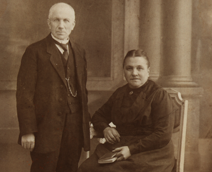Why You Should Never Trust a Hollywood Biopic
Most movie biographies– almost all of them, nowadays, in fact– are the result of incestuous relationships between the guardians and owners of copyrighted material and the film-makers. The guardians want a fawning tribute to their deceased or not so deceased beloved. The film-maker wants a hit movie. If it’s about Ray Charles, it’s got to have his music in it. Well, who controls the rights to that music? Right– Ray Charles’ family and heirs.
I am not talking about minor changes in order to fit the biographical narrative into a digestible 90 minute experience. I accept time compression and combinations of different characters. It’s the vanity stuff I object to, and the sliming of people in order to create a villain where none existed, to provide dramatic tension.
And I’m not talking about movies that were never intended to be biographical, “Amadeus”. “Amadeus” is not about Mozart’s life; it is about the random kindnesses and cruelties of fate that awards talents to the unworthy and worthy without justice.
And I forgot the third leg of this unholy tripod: the audiences, which are more than happy to be deceived about their heroes. Johnny Cash did drugs because of a childhood trauma. David Helfgott was a great pianist. John Nash’s wife stuck with him through thick and thin. Oskar Schindler lifted a steam locomotive. Elton John’s father abandoned him and never supported his musical career. A record producer rejected Freddie Mercury’s (awful) “Bohemian Rhapsody”.
The Hollywood argument that you have to fictionalize because, well, you just have to, is utter bullshit, and there are a handful of Hollywood biopics that prove the point, including “I, Tonya” and “The Pianist”.
All parties to the charade make all the correct noises about “authenticity” and “warts and all” without the slightest intention of letting anyone else decide which warts deserve exposure and which might better be left in the dark. The audience, indulged in with a few carefully chosen scenes of debauchery or alcohol abuse, are convinced that the movie is telling it all. The actor hopes to get a chance, like Reese Witherspoon, to realize their life-long dream of becoming a country music singer!
Bring it on, Reese! I just hope that Dolly Parton, sitting in the audience, didn’t feel that her career achievements were in any way diminished by the fact that Reese Witherspoon only required a few months to render a creditable counterfeit.
Biopics
I Walk the Line
(2005, d. James Mangold, Joaquin Phoenix, Reese Witherspoon) More honest than most, but formulaic as hell. Carefully calibrated so that you don’t judge Cash too harshly for his drug use. And I really do hope that people don’t get the impression that this is what Johnny Cash and June Carter really sound like.
Coal Miner’s Daughter
(1980, D. Michael Apted, Sissy Spacek) Loretta Lynn has consistently claimed she was married at 13. In fact, county records show she was fifteen when she married Dolittle Flynn.
Buddy Holly Story
(1978, D. Steve Rash, Gary Busey) Cheese please: This film shows Holly writing a score in the studio– Holly could neither write nor read music. And where did the fourth Cricket go?
Ray
(2004, D. Taylor Hackford, Jaime Foxx) The state of Georgia never banned Ray Charles.
Backbeat
(1994, D. Iain Softley, Stephen Dorff, Ian Hart, Gary Bakewell, Chris O’Neill, Scot Williams) No Lennon-McCartney originals were used, or harmed, in the making of this otherwise intriguing production. One of the better biopics of this bunch.
Pollock
(2000, D. Ed Harris, Ed Harris) Ed Harris, Ed Harris, Ed Harris, Ed Harris….
Beautiful Mind
(2001, D. Ron Howard, Russell Crowe.) Omits any mention of his subversive period, his alleged homosexuality. And Nash didn’t see things– he heard voices. And his wife did leave him.
Great Balls of Fire
(1985, D. Jim McBride, Dennis Quaid) Conveniently ended in 1959, before the suspicious deaths of two of Lewis’ wives.
Schindler’s List
(1993, d. Steven Spielberg, Liam Neeson) That ridiculous last scene— Schindler weeping and wailing that he could have saved more if he had only sold his rings– never happened, and insults his memory. Spielberg just couldn’t help himself– just in case you didn’t get it, he has to clobber you over the head with just how slobbering beautiful Schindler’s actions seem to day. They were beautiful– but shameless ham-fisted scenes like this only raise doubts about the integrity of the rest of the movie. Schindler’s wife, shown fondly appreciating him in the film, actually left him. The book, incidentally, was originally marketed as fiction– the author took some true events and “fictionalized” them for whatever reason (possibly because he was unable to verify his information to acceptable journalistic standards). It was only when Spielberg decided to make a movie that it was rebranded as “non-fiction”. What changed? Spielberg’s desire to give the movie more gravitas.
Finding Neverland
(2004, D. Marc Foster, Johnny Depp) This one might take the cake– J. M. Barrie’s relationship to the Llewelyn children was problematic– all of them, later in life, had very ambivalent feelings about Barrie– to say the least. The boy for which Peter is named threw himself under a train at the age of 65, detesting his association with the play. Two of the other children died under suspicious circumstances (possible suicides). But this version makes him look like a lovable saint. Who owns the rights to “Peter Pan”? The Great Ormond Street Hospital. Would they like you to think ill of their cash cow? Sylvia Llewelyn Davies, incidentally, was not a widow when J. M. Barrie began visiting and monopolizing her children. Barrie himself was married earlier but never consummated the marriage.
Capote
(2005) Since Capote is long dead and he didn’t sing, more honest than most.
The Rose
( 1979) Disguised biography of Janis Joplin. It is an utterly depressing world we live in if it is to be believed that Bette Midler can supply anything remotely resembling even a facsimile of Janis Joplin’s singing performances. You owe it to yourself, if you have to seen this movie, to purge your soul with a viewing of an honest-to-god performance by the real Janis Joplin.
The Doors
( 1991) Oliver Stone’s bizarre and often tiresome portrait of Jimmy Morrison has at least one virtue: it isn’t unduly flattering. And it has a relatively impressive performance by a very committed Val Kilmer. There is a moment: the live performance of “Light my Fire” at least gives you something so lacking in most of these biopics– a moment in which you might actually apprehend what it was that made the artist great in the first place.
Shine ()
Where do I begin?
Marie Antoinette
My goodness– and we all thought the Queen was plotting, right up to the end, to bring in Austrian armies to put down the revolution! Well, she was.
Farewell My Queen
The exception: an exquisite antidote, though slow-moving, paean to the roles of Antoinette’s servants and sycophants in the last days of the Louis XVI regime.
42 (Forty-two)
The myth is this: the Brooklyn Dodgers with the rookie, Jackie Robinson, the first black player in Major League Baseball, were playing in Cincinnati on May 13, 1947, one of the most southern cities in the league. Robinson was being subjected to horrible, incessant abuse, name calling, death threats, mockery, when another Brooklyn player, an esteemed local named Pee-Wee Reese, walked up to him and put his arm around him to send a message to the fans: we are brothers. Don’t abuse my friend. There is even a bronze statue memorializing the event in New York at the Brooklyn Cyclones home field.
It didn’t happen. It was first reported by a pitcher who said he saw it while he was warming up in the bullpen to pitch in the first inning. The records show that someone else was pitching the first inning. No newspaper of the time reported the incident. Pee-Wee Reese was a lifelong friend of Robinson’s and certainly behaved honorably towards him but Eddie Stanky is the one who threatened to fight Philadelphia players who were harassing Robinson.
An incident like it may have happened in 1948, in Boston. Maybe. But if it did, it wasn’t reported until 1952, well after the “experiment” (breaking the color barrier) had been widely regarded as a success.
Diversions
Jesus Biopic:
When Hollywood made King of Kings in 1960, it decided it couldn’t be too careful with the first talking film about the Son of God. Test screenings were held for carefully selected representative preview audiences to garner their reactions to the film. Would audiences find the idea of a celluloid Christ shocking? Would they be offended at the idea of Hollywood packaging and glamorizing the story of salvation? Would they be appalled at the vivid scenes of Christ on the cross, one of the most sacred images of the Christian religion?
Friday, January 24, 2020



